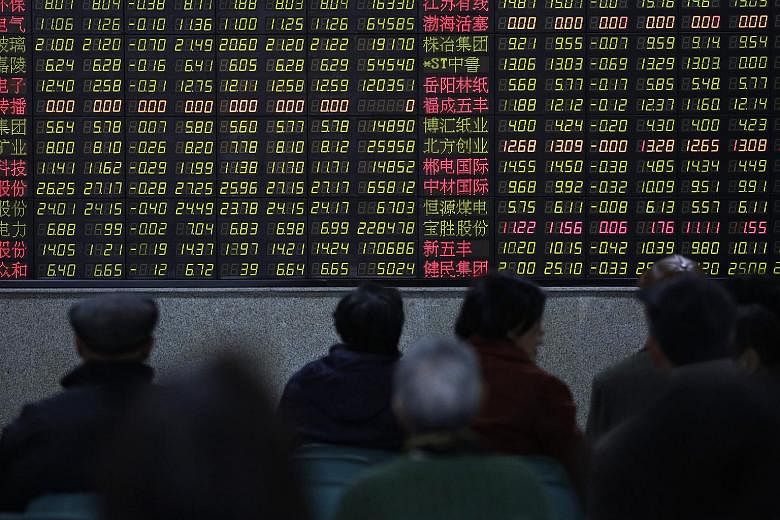SHANGHAI • As China's legions of retail investors flee the country's tumultuous equity markets, pushing stock prices down by about 15 per cent so far this year, money is flowing into perceived safe-haven assets such as domestic bonds, gold and the dollar.
Unlike Western markets where institutional investors dominate, individuals account for 80 per cent of transactions on Chinese exchanges. Nearly 100 million people have trading accounts.
Their enthusiasm for stocks drove China's main indexes to record highs in the first half of 2015, but after a summer bust in which prices plunged by around 40 per cent, this month's sell-off has been the final straw for many.
"I just have a small amount of money in the stock market. I had planned to sell when indexes got a little bit higher, but soon it dropped to this situation," said Mr Zhou Junan, a 22-year-old retail investor in Guangdong. "I don't have faith in the stock market any more. I think it's better to buy dollars."
Weekly data from the Shanghai Stock Exchange shows money now shifting into exchange-traded funds tracking bonds, gold and money markets.
Funds that provide a vehicle for Chinese individuals to invest in overseas stocks and bonds through the Qualified Domestic Institutional Investor (QDII) scheme are also popular, continuing a trend that began late last year.
The Securities Times newspaper reported yesterday that 10 mutual funds under QDII had suspended or restricted taking subscriptions after strong demand led to quota shortages. The measures followed a nearly 10 per cent jump in the assets of such funds in December alone.
As well as the renewed slide in stocks, ordinary Chinese investors have been shaken by last week's acceleration in the decline of the yuan, which has fallen nearly 5 per cent since August.
"The stock market is in a mess," said a 48-year-old bank worker in Kunshan, who bought 500,000 yuan (S$109,000) worth of US currency. "Dollar is far less risky."
The situation has also fuelled demand for gold.
"Except for gold, all other assets are just bubbles to me," said a 24-year-old female investor in Beijing. "I guess I am a pessimist. If there are really some global conflicts, even dollars and bonds could not buy a meal."
A number of retail investors said they were switching money out of stocks and into wealth management products and principal-protected funds.
Other investors said they were giving up on making a return on their savings and focusing instead on Chinese New Year celebrations next month.
REUTERS

